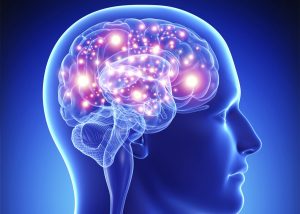The main goal that Concordia College has for their students is that during their time in school, they learn to BREW – Become Responsible Engaged in the World. Part of the way that they do that is through their CORE curriculum, which requires students to get a variety of classes, even outside of their major and minor. Part of that curriculum is that requirement of a “capstone” class.
Neurochemistry is the class that I decided to take as my capstone class, and it was one of my favorite classes during my time here at Concordia. First off, I learned so much about the brain, signaling pathways within the brain, and how dysfunction of these pathways can contribute to some of the most common diseases that people experience in the United States. These included Alzheimer’s Disease, Autism, ALS, Concussion, Addiction, mental illness, anxiety/PTSD, Parkinson’s Disease, and eating disorders/obesity. The class was more interactive and discussion-based than my other classes I had. We would learn together as a class by reading through articles and discussing them together, as they could be difficult to wrap your head around at times. The brain is a really complex organ!

The first couple weeks of the semester was review on signaling pathways and molecules, but the rest of the semester followed the same pattern. We would read the article over the weekend and discuss it on Monday, trying to make sense of what was going wrong in the brain and affected neural synapses or release of hormone and neurotransmitters, and how it differed from the normal functioning. For Wednesday, we would each research something that the class wanted to know more about related to the topic for the week. We would then do “speed dating,” each giving our spiel in about three minutes. Then Friday would be just a class discussion. There would be discussion leaders, but it was informal and some really interesting comments and discussions ensued during those times. We would then write blog posts every week on Area Voices related to the topic, so that we were able to convey our knowledge to the public.
One of Concordia’s goals is to instill a love for learning. For me, this class did this as the topic were relevant to my interests and future, as I am planning to go to medical school. I was able to tie what we were learning about to previous classes and understand the biology and chemistry of synaptic signaling in the brain to a deeper level. The way the class was set up I think also peaked students interests to be engaged.
Concordia also strives to develop foundational skills and transferable learning capabilities. This class was relevant to other classes I have taken in my major, and I know that I will use the knowledge I learned in my future medical classes. It also improved my skills in being able to read and understand scientific articles.
Concordia also wants to develop understanding of disciplinary, interdisciplinary, and intercultural perspectives and their connections. Like I mentioned, neurochemistry is related to many other topics in biology, such as physiological processes, immune system processes, and other. Some of the research students did in this class also looked at differences of some disorders in different areas of the world. It also brought to light how some different cultures may view sickness in a different light than we do in the United States.
Another goal Concordia has is to cultivate an examined cultural, ethical, physical, and spiritual self-understanding. These are things that would come up in our discussions. Questions about how cultures experience illnesses in different ways. It is also interesting to look at the prevalence differences between races and parts of the world. This class also provided information for me to better understand what goes on in my body, and how it may have certain effects if it is altered. It helped me to understand what is happening in the brains of people who do struggle with the diseases that we talked about.
Finally, the biggest part of BREW is responsibly participating in the world. We each were involved in a community action project. The one my group did was on addiction in the community. We had representatives from Dakota Medical Foundation and an addiction counselor come in and talk as part of our presentation. They had great things to say, and it really addressed how addiction is a problem in our community here, with their statistics and stories that they told. My group wanted to emphasize to our audience how addiction is a disease, as there are actual chemical and structural changes that take place in the brain that make it essentially impossible for that person to break free from their addiction without help. We wanted to encourage students here and others in the community to get help if they need, or to address the issue with someone they know is struggling.

Like I mentioned, neurochemistry was one of my favorite classes I took over my four years at Concordia. It encouraged my participation in class and in the community. It required me to think critically and take knowledge from other classes to better make sense of the topics we discussed. It also pushed me to think about the future and how these diseases may be cured, prevented, or new treatments developed to help people.
My Capstone Experience
